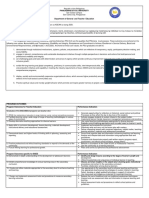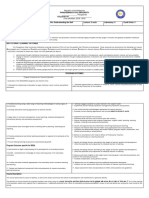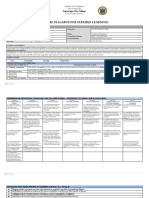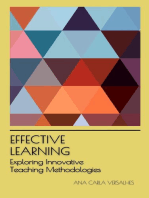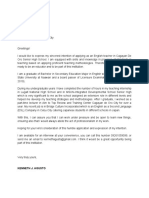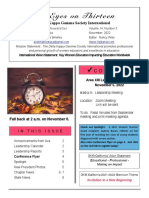Educ 2 (BSED) - New Template
Educ 2 (BSED) - New Template
Uploaded by
Carl Martin EngcoyCopyright:
Available Formats
Educ 2 (BSED) - New Template
Educ 2 (BSED) - New Template
Uploaded by
Carl Martin EngcoyOriginal Description:
Copyright
Available Formats
Share this document
Did you find this document useful?
Is this content inappropriate?
Copyright:
Available Formats
Educ 2 (BSED) - New Template
Educ 2 (BSED) - New Template
Uploaded by
Carl Martin EngcoyCopyright:
Available Formats
Republic of the Philippines
North Eastern Mindanao State University
Tagbina, Surigao del Sur (8308)
www.nemsu-tagbina.edu.ph
OUTCOMES-BASED COURSE SYLLABUS IN
EDUC 2: FACILITATING LEARNER-CENTERED TEACHING
1st Semester, A.Y. 2023 – 2024
PHILOSOPHY
NEMSU believes that higher education is an instrument for the improvement of life through democratized access to quality education in the development
of a well-rounded person.
VISION
A transformative leading University in Asia and the Pacific.
MISSION
NEMSU shall provide competency-based higher education training through transformative instruction, relevant research, sustainable extension and
production responsive to local, regional and global trends.
1. Produce competent and skilled graduates prepared for gainful employment;
2. Develop graduates who shall not only foster economic progress but also care for the environment, adhere to positive value system, and preserve
cultural heritage;
3. Engage in high-impact research for instruction and develop technology for food security and renewable energy;
4. Collaborate with government and non-government agencies to help improve the lives of the marginalized groups; and
5. Promote cooperation/partnership among regional, national, and ASEAN institutions in Higher Education.
CORE VALUES
Educ 2: Facilitating Learner-centered Teaching FM-ACAD-011/Rev.003/1.26.2023/Page 1
Competence
A combination of observable and measurable knowledge, skills, abilities, and personal attributes that contribute to enhance SDSSU
employee and student performance and ultimately result in organizational success.
Accountability
Responsibility for own actions, decisions and commitment to accomplish work in an ethical, efficient, cost-effective and transparent manner
manifesting the value of sound stewardship in the wise use of resources for common good.
Responsiveness
A prompt action, consistent communication, quality information, and a focus on providing a superior experience to stakeholders.
Excellence
The quality spectrum at exceptional levels demonstrated by learning outcomes and the development of shared culture of quality consistent
with the vision, mission and goals of University.
Service
Dedication for a continuous improvement of services, stakeholder’s relationships and partnership which stresses interdependence and
collaboration for a sustainable success of clients and their communities in helping build a just, peaceful, stable and progressive Filipino
nation.
NEMSU CARES…
These core values are not descriptions of the work we do, nor the strategies we employ to accomplish our University vision. They are the core values
that underlie our works and interactions as we internalize responsibilities to fulfil our mission. They are the basic elements of how we go about our
work and how we deal with stakeholders, molds students to become competent, innovative, globally competitive and service-oriented.
QUALITY POLICY
The North Eastern Mindanao State University commits itself to produce highly motivated, globally competitive, and morally upright human resource
through the delivery of transformative and quality higher education that conforms to international standards driven by excellent instruction, relevant
researches, sustainable extension, and production services. Together with our stakeholders, we shall endeavor for continual improvement of our
quality management system in consonance with statutory and regulatory requirements for clients and industry satisfaction for quality of life.
Educ 2: Facilitating Learner-centered Teaching FM-ACAD-011/Rev.003/1.26.2023/Page 2
INSTITUTIONAL LEARNING OUTCOMES (ILOs)
ILO1. Imbue global competency and innovation for a future-ready workforce.
ILO2. Acculturate the values of professionalism, honor, and excellence that promote productivity in the workplace and the community.
ILO3. Propagate the culture of research, extension, and production for sustainable economic viability, environmental stewardship, and social equity in
North Eastern Mindanao and beyond.
COLLEGE GOALS:
The College of Teacher Education will produce competent teachers imbued with ethical values and ideals in the humane environment supportive to
national thrust for social transformation. It is committed to provide students with:
1. Quality training in their respective field of specialization.
2. Knowledge, skills and values system responsive to the needs of the communities.
3. Quality education through relevant instruction, research, extension and use of information and communication technology for teaching and life-
long learning.
4. Productive activities relevant to their field of specialization.
5. Ethical values to maintain the moral of our society.
PROGRAM LEARNING OUTCOMES (PLOs):
Programs Learning Outcomes Performance Indicators
PLO1. Demonstrate deep understanding of specific concepts and Display basic and comprehensive understanding of knowledge,
principles principles of the subject matter in the sciences
PLO2. Apply scientific inquiry in teaching and learning Apply the scientific principles in solving current problems
PLO3. Utilize effective science teaching and assessment methods Design and utilize appropriate instructional materials
Employ effective teaching techniques for diverse types of learners in
varied learning conditions
Design and utilize a variety of appropriate assessment techniques to
monitor and evaluate learning
Provide regular feedback to students
PLO4. Manifest meaningful and comprehensive pedagogical content Utilize appropriate pedagogy and use of technology for the different
Educ 2: Facilitating Learner-centered Teaching FM-ACAD-011/Rev.003/1.26.2023/Page 3
knowledge of the sciences science content areas
Demonstrate skills in various methods of teaching-learning in the
sciences to include conducting science investigations, making models
and prototype, and doing science research
Create and utilize learning experiences in the classroom to develop
learner’s skills in discovery learning, problem learning and critical
thinking
COURSE CODE : Educ 2
COURSE DESCRIPTIVE TITLE : Facilitating Learner-centered Teaching
COURSE PRE-REQUISITE : None
CREDIT UNITS : 3 units
NO. OF HOURS : 3 hours a week or 54 hours a semester
COURSE DESCRIPTION
This course is designed to explore and equip pre-service teachers with the fundamental principles, processes, and practices anchored on
learner-centeredness and other educational psychologies supportive of learning environments as these apply to facilitate various teaching- learning
delivery modes to enhance learning. It also includes the demonstration of knowledge and understanding of differentiated teaching to suit the learners’
gender, needs, strengths, interests and experiences. Further, pre-service teachers will be trained to implement teaching strategies that are responsive
to learners’ linguistic, cultural, socio-economic and religious backgrounds. (CMO No 74 s. 2017)
COURSE LEARNING OUTCOMES (CLOs):
Course Learning Outcomes ILO Code/s PLO Code/s BTIs Covered
CLO1. Demonstrate understanding of the fundamental principles, processes, and practices ILO1 PLO3, PLO4, 1.1.1, 1.2.1,
anchored on learner-centeredness and other educational psychologies supportive of learning 2.2.1, 2.4.1,
environments 2.5.1, 2.6.1,
6.3.1
CLO2. Demonstrate knowledge and understanding of differentiated teaching to suit the ILO1 PLO3, PLO4, 3.1.1, 3.2.1,
learners’ gender, needs, strengths, interests and experiences 3.4.1
CLO3. Design a lesson plan applying the principles, processes, and practices of learner- ILO1 PLO1, PLO2, 3.2.1, 4.1.1
Educ 2: Facilitating Learner-centered Teaching FM-ACAD-011/Rev.003/1.26.2023/Page 4
centered teaching to enhance learning PLO3, PLO4
CLO4. Implement teaching strategies that are responsive to learners’ diversity ILO1, ILO2 PLO1, PLO2, 1.1.1, 1.5.1
PLO3, PLO4 3.2.1
Detailed Course Learning Plan
Time Course Intended Topics/Content Instructional Learning Assessment CLOs
Frame Learning Outcomes Methodology Materials/Resources Code/BTIs
(CILOs) (Face-to-Face and
Remote Teaching)
Week 1 Orientation of the Course: Lecture
- Course syllabus
- Grading System
- Course performance
indicators
- Class/course policy
Introduction and Overview of
the Course
Week 2 - differentiate Unit 1 Learner-centered Flipped Classroom Video Lessons Classroom CLO1
3 learner-centered teaching: Journal Writing Simulation
teaching from Foundations and characteristics True or False
other teaching Test
A. Learner-centered teaching
approaches (e.g.
1. Definition
teacher- centered 2.Description/
approach) as Characteristics
applied in various
teaching areas; B. Paradigm shift: From
discuss the need teacher- centered to learner-
to shift from centered teaching
teacher-centered 1. Philosophical perspectives -
teaching to Teacher-centered philosophies
- Essentialism
Educ 2: Facilitating Learner-centered Teaching FM-ACAD-011/Rev.003/1.26.2023/Page 5
learner-centered - Perennialism
teaching based
on philosophical 2. Learner-centered
foundations, philosophies
- Progressivism
teaching - Humanism
principles and - Constructivism
current research;
and C. Dimensions of learner-
discuss the centered teaching
varied roles of the 1. The function of content
teacher in 2. The role of the instructor
learner-centered 3. The responsibility for
teaching and learning
learning. 4. The purposes and
processes of assessment
5. The balance of power
Week 3 - discuss the Unit 2 – Learner-centered Flipped Classroom Video Lessons Differentiated CLO1
4 psychological Psychological Principles Differentiated Assessment CLO2
principles of Instruction Using Multiple
learner- A. Cognitive and Journal Writing Intelligences
centeredness as Metacognitive Factors Cloze Test
a basis for 1. Nature of the learning Essay Writing
process
differentiated 2. Goals of the learning
teaching to suit process
learner’s gender, 3. Construction of knowledge
needs, strengths, 4. Strategic thinking
interests and 5. Thinking about thinking
experiences; 6. Context of learning
identify and
discuss factors B. Motivational and Affective
that promote Factors
learner- 1. Motivational and
centeredness emotional influences
and motivate 2. Intrinsic motivation to
Educ 2: Facilitating Learner-centered Teaching FM-ACAD-011/Rev.003/1.26.2023/Page 6
learners to work learn
productively and 3. Effects of motivation on
be accountable effort
for their own
learning; C. Developmental and Social
reflect on how Factors
developmental 1. Developmental
and social influences on learning
factors can
influence 2. Social influences on
learning
learning
environments to D. Individual Differences
promote fairness, 1. Individual differences in
respect and care;
learning
and
relate RA 10533 2. Learning and diversity
and the K-to-12 3. Standards and assessment
framework to the
principles of E. Legal and Policy
learner- Frameworks and Learner-
centeredness. centered Teaching
1. RA 10533
2. K-to-12 Framework
Week 5 - describe the Unit 3 – Learner-centered Lecture Powerpoint Lesson Plan CLO3
8 different parts, Lesson Plans Presentation Making
functions and Sample Lesson Plan
characteristics of A. The Learner-centered
DepEd Order No. 42,
a learner- Lesson Plan
s. 2016
1. Detailed lesson vs. daily
centered lesson lesson log
plan; 2. Parts of the learner- centered
compare and lesson plan
contrast an
exemplar B. Instructional Learning
learner-centered Processes
Educ 2: Facilitating Learner-centered Teaching FM-ACAD-011/Rev.003/1.26.2023/Page 7
lesson plan with 1. Learning objectives
teacher- or 2. Teaching content
content-centered 3. Lesson planning
lesson plans; - Pre-planning
craft a lesson - Lesson planning
plan chunk - Implementation
emphasizing the - Evaluation
use of a selected
strategy; and
Week 9 Midterm Examination Major Output:
Learner-centered
Lesson Plan
Week 9 - discuss the nature Unit 4 –Learner-centered Problem-based Video Lessons Simulations CLO4
10 of learner- Pedagogy learning Powerpoint Quiz
centered teaching Workshop presentations
modalities, A. Delivery Modalities Fact Sheets
structures, 1. Face-to-face
methods and 2. Blended learning
strategies that 3. Technology-based, Online/ e-
Learning
facilitate 4. Distance learning
differentiated
teaching to suit B. Structures for Facilitating
learners’ gender, Learner-centered Teaching
needs, strengths, 1. Formal (Traditional)
interests and 2. Alternative Learning System
experiences; (ALS)
select appropriate - Non-formal education
learner- centered (NFE)
teaching - Informal education (InfEd)
modalities, - The Mobile Teacher
structures, 3. Alternative Delivery Modes
(ADM)
methods and
- Modified In-School Off-
strategies based
School Approach (MISOSA)
Educ 2: Facilitating Learner-centered Teaching FM-ACAD-011/Rev.003/1.26.2023/Page 8
on learners’
diverse needs, - Enhanced Instructional
learning styles Management by Parents,
and backgrounds Community and Teachers (e-
IMPACT)
(i.e. linguistic,
cultural, socio- - Open High School Program
economic and (OHSP)
religious); and
draw on C. Methods and Strategies
appropriate 1. Methods
learner- centered - Active learning activities
teaching -Cooperative learning activities
modalities and -Inquiry and inductive learning
activities
strategies to
formulate 2.Learner-centered
teaching Instructional Strategies
procedures that - Cooperative learning
address the - Presentations
special - Panels/Experts
educational - KWL (or KWHLAQ)
needs of - Brainstorming
- Learner-created media
learners in - Discussion
difficult - Small group
circumstances. - Case studies
- Jigsaw
- Learning centers
- Experiments
- Role play
- Simulation
- Laboratory
- Workshop
- Demonstration
- Index card
- Inquiry-based
- Mental models
Educ 2: Facilitating Learner-centered Teaching FM-ACAD-011/Rev.003/1.26.2023/Page 9
- Project-based learning
- Problem-based
learning 3.2.1
- Discovery learning
- Q & A session
- Social media
- Games or gamification
- Competitions
- Debate
D. Flexible Learning and
Teaching
E.
Differentiated Teaching
Week 11 discuss various Unit 5 – Organization and Q and A Session Video Lessons Quiz CLO4
forms of learner Management of Learner- Inquiry-based Powerpoint
centered Centered Classrooms Learning Presentation
classroom
organization A. Forms of learner-centered
based on learners’ classroom organization,
needs; procedures and physical
formulate structure
classroom 1. Room structuring
procedures and - For individualized learning
- For group learning
routines that - Activity-oriented
promote discipline, classroom
fairness, respect 2. Classroom routines and
and care among procedures
learners and 3. The social environment:
encourage Fairness, respect, care and
learning; encouraging learning
design, organize 4. Creating motivating
and explain the learning environment
Educ 2: Facilitating Learner-centered Teaching FM-ACAD-011/Rev.003/1.26.2023/Page 10
significance of the
layout of the B. Learner-centered classroom:
physical structure Roles and responsibilities
of the classroom 1. Of teachers
for active 2. Of learners
engagement of
learners, C. The role of discipline in
individually or in learner- centered classrooms
groups, in 1. Collaborative class
norms
exploration,
2. Logical consequences
discovery, hands-
3. Consistent application
on and self-
4. Student-specific
learning activities;
5. Time for resolution
describe the 6. Calm spaces
roles and
responsibilities
of the teacher
and the learners
for a supportive,
inspiring,
motivating and
productive
learner-centered
classroom; and
evaluate which
disciplinary
actions are
positive and non-
violent in the
management of
learner behavior.
Week implement the D. Lesson chunking and Peer Teaching Varied Instructional Demonstration CLO4
12 - 18 designed lesson Microteaching Basics Materials Teaching
Educ 2: Facilitating Learner-centered Teaching FM-ACAD-011/Rev.003/1.26.2023/Page 11
plan chunk and
the appropriately
chosen/selected
strategy in
response to
learners’ diverse
needs, learning
styles and
backgrounds (i.e.
linguistic, cultural,
socio-economic
and religious).
Week 18 Final Examination Major Output:
Demonstration
Teaching
COURSE REFERENCES AND SUPPLEMENTAL READINGS
Books
Bulusan, F. et al (2019). Facilitating learner-centered teaching. REX Book Store.
Educ 2: Facilitating Learner-centered Teaching FM-ACAD-011/Rev.003/1.26.2023/Page 12
Online Sources
MERLOT: Multimedia Educational Resource for Learning and Online Teaching (n.d.). Pedagogy. Retrieved April 8, 2023, from
https://www.merlot.org/merlot/Pedagogy.htm
PCC Library (n.d.). Learner-centered instruction. Retrieved August 3, 2022, from
https://www.pcc.edu/library/library-and-learning/resources-strategies-learner-centered-instruction/
CVAdult (n.d.). Lesson Plan. Retrieved August 4, 2023, from
http://www.cvadult.org/images/Lesson_Plan_Template_with_explanations.pdf
Teach Thought (n.d.). Research-based instructional strategies. Retrieved August 1, 2023, from
https://www.teachthought.com/learning/32-research-based-instructional-strategies/
Visible Thinking (n.d.). Thinking routines. Retrieved August 1, 2023, from
http://www.visiblethinkingpz.org/VisibleThinking_html_files/03_ThinkingRoutines/03a_ThinkingRoutines.html
Resource Library (n.d.). Teaching strategies. Retrieved July 28, 2023, from
https://www.facinghistory.org/resource-library/teaching-strategies
DepEd (n.d.). Inclusive education. Retrieved July 27, 2023, from
http://www.deped.gov.ph/k-to-12/inclusive -education/about-alternative-learning-system/
GRADING SYSTEM:
Requirements - 20%
Educ 2: Facilitating Learner-centered Teaching FM-ACAD-011/Rev.003/1.26.2023/Page 13
Class Standing - 40%
-Quizzes - 20%
-Oral Recitation - 10%
- Assignment - 5%
- Attendance - 5%
Major Exams - 40%
TOTAL 100%
COURSE POLICIES:
1. Mobile Device Usage: During class sessions, the use of mobile phones is generally discouraged. However, mobile phones may be used if specific
course activities require them and necessitate internet connectivity. Please ensure that such usage is respectful to the learning environment.
2. Assessment Procedures: There will be no special tests for quizzes or oral recitations. All assessment methods will be communicated in advance
through the course syllabus.
3. Late Submissions: Timely submission of assignments and projects is essential. Points will be deducted for late submissions, so it is crucial to
adhere to deadlines. If you foresee any challenges meeting a deadline, please contact the instructor in advance.
4. Major Outputs: Students are expected to complete and submit all major assignments as outlined in the course syllabus. Failure to do so may
result in an incomplete grade, which can have academic consequences.
5. Academic Integrity: Plagiarism, which includes copying and presenting someone else's work as your own, is strictly prohibited in all submitted
assignments and outputs. Make sure to properly cite sources and use original work.
6. Compliance with Course Requirements: To ensure a successful course completion, it is imperative that you comply with all requirements stated
in the course syllabus. This includes attending classes, participating in discussions, and completing assignments as specified.
7. Special Examinations: In cases where students have valid reasons for missing major exams (e.g., medical emergencies or documented personal
issues), they may request a special examination. Please communicate such situations with the instructor promptly.
8. Respectful Conduct: Any form of bullying, discrimination, or harassment, whether in person or online, is strictly prohibited. We are committed to
maintaining a safe and respectful learning environment for all students.
Date of Revision : August 1, 2023
Date of Effectivity : August 14, 2023
Prepared by: Content Noted: Reviewed by: Recommending Approval: Approved by:
Educ 2: Facilitating Learner-centered Teaching FM-ACAD-011/Rev.003/1.26.2023/Page 14
LYOID C. HUNAHUNAN, EdD XXXXXXXXXXXXXXXXX XXXXXXXXXXXXXXXXX
Associate Professor 1, Prog. Coor , Tandag Dept. Chair , Tandag
Tagbina Campus Campus Campus
ANNIE Y. SAMARCA, PhD MARIA LADY SOL A.
xxxxxxxxxxxxxxxxxxxxxxxxxx Dean CTE SUAZO, PhD
Asst. Prof 1, Tandag Campus XXXXXXXXXXXXXXXXX XXXXXXXXXXXXXXXXX Vice President for Academic
Prog. Coor, Lianga Dept. Chair, Lianga Campus Affairs
Campus Date: ________________ Date: _________________
XXXXXXXXXXXXXXXX
Asst. Prof 2, Lianga Campus LYOID C. HUNAHUNAN, EdD
JANVIELLE V. ROSAL, Dept. Chair, Tagbina
MAEd Campus
XXXXXXXXXXXXXXXXX Prog. Coor, Tagbina
Asso. Prof 1, Cantilan Campus
Campus XXXXXXXXXXXXXXXXX
Dept. Chair, Cantilan
XXXXXXXXXXXXXXXXX Campus
XXXXXXXXXXXXXXXXX Prog. Coor, Cantilan
Asso. Prof 1, Bislig Campus Campus
XXXXXXXXXXXXXXXXXXXX
Asst. Prof. 2, San Miguel
Campus Date: _______________ Date: _________________
Date: _________________
Educ 2: Facilitating Learner-centered Teaching FM-ACAD-011/Rev.003/1.26.2023/Page 15
You might also like
- REVISED Module in Prof Educ 103 2020Document78 pagesREVISED Module in Prof Educ 103 2020hpnadong100% (1)
- Educ 1 Cad 2018 SyllabusDocument8 pagesEduc 1 Cad 2018 Syllabusapi-22435262897% (30)
- Piano Pronto Teacher Welcome Kit 2019 PDFDocument15 pagesPiano Pronto Teacher Welcome Kit 2019 PDFMaria Celeste Rinaudo0% (1)
- Educ 2 (BEED) - New TemplateDocument16 pagesEduc 2 (BEED) - New TemplateCarl Martin EngcoyNo ratings yet
- PATHFit 4 Volleyball BSEDDocument7 pagesPATHFit 4 Volleyball BSEDJULIUS JIM CREDONo ratings yet
- Educ 9 SyllabusDocument17 pagesEduc 9 SyllabusGezelle GemaoNo ratings yet
- PATHFit-4-volleyball - BEEDDocument8 pagesPATHFit-4-volleyball - BEEDJULIUS JIM CREDONo ratings yet
- Btled Ict 1 2020 Iso Obe Syllabus2Document6 pagesBtled Ict 1 2020 Iso Obe Syllabus2Angelica Perez NimesNo ratings yet
- Syllabus in Ge PPC 2023 BeedDocument19 pagesSyllabus in Ge PPC 2023 BeedreymondpandelingNo ratings yet
- GEL 2 SyllabusDocument17 pagesGEL 2 SyllabusEunice Dela Banda ServentoNo ratings yet
- Eng 102 LiteratureDocument13 pagesEng 102 LiteratureGezelle GemaoNo ratings yet
- ECE 16 - Infant and Toodler ProgramDocument15 pagesECE 16 - Infant and Toodler ProgramGrace Ann LumakinNo ratings yet
- Eng 101 (BEED) - New Template SyllabusDocument14 pagesEng 101 (BEED) - New Template SyllabusGezelle GemaoNo ratings yet
- EL 100 Msjbfinal OBE Intro. To LinguisticsDocument9 pagesEL 100 Msjbfinal OBE Intro. To LinguisticsJovilleNo ratings yet
- Understanding The Self SyllabusDocument31 pagesUnderstanding The Self SyllabusMond SimeonNo ratings yet
- Fil 102 - Pagbasa - SyllabusDocument8 pagesFil 102 - Pagbasa - SyllabusKim Per100% (1)
- Pangasinan State University College of Teacher Education Course SyllabusDocument7 pagesPangasinan State University College of Teacher Education Course SyllabusLYCA DELA CRUZNo ratings yet
- 2223 Prof Ed 06 - The Teacher and The School CurriculumDocument8 pages2223 Prof Ed 06 - The Teacher and The School CurriculumCyl perezNo ratings yet
- Understanding The Self SyllabusDocument30 pagesUnderstanding The Self SyllabusHailie Jade BaunsitNo ratings yet
- FIL 118 Pagtuturo at Pagtataya Sa Panitikan SyllabusDocument8 pagesFIL 118 Pagtuturo at Pagtataya Sa Panitikan SyllabusJovito Limot100% (3)
- Bachelor of Technology in Livelihood Education Btled - Afa TeacherDocument11 pagesBachelor of Technology in Livelihood Education Btled - Afa TeacherJames D. MaldaNo ratings yet
- Syllabus in Edukasyong Pantahanan at Pangkabuhayan 2Document19 pagesSyllabus in Edukasyong Pantahanan at Pangkabuhayan 2RedMoonLight100% (2)
- Syllabus Understanding The SelfDocument11 pagesSyllabus Understanding The SelfAngge Cordova100% (1)
- Ed D Syllabus Gs Educ 604Document10 pagesEd D Syllabus Gs Educ 604Maria Lyn Samson MagnoNo ratings yet
- DOE 3 Ethics of School Managers Course OutlineDocument5 pagesDOE 3 Ethics of School Managers Course OutlineAbegail AlangueNo ratings yet
- Components of The Curriculum Sept 16Document24 pagesComponents of The Curriculum Sept 16Rechelle TapireNo ratings yet
- P.E 1 SCI NewDocument17 pagesP.E 1 SCI NewEarl GregorioNo ratings yet
- Assessment KemeDocument15 pagesAssessment Kemeangele lasconaNo ratings yet
- GEC 3 Mathematics in The Modern World For BSEDocument11 pagesGEC 3 Mathematics in The Modern World For BSERochelle Ico SanchezNo ratings yet
- Pangasinan State University COLLEGE OFDocument10 pagesPangasinan State University COLLEGE OFAyessa Joy GarciaNo ratings yet
- 1 TTLEG Syllabus-in-TTL-2-AllanDocument8 pages1 TTLEG Syllabus-in-TTL-2-Allanmascardo franzNo ratings yet
- Syllabus-Foundation of Special and Inclusive EducationDocument19 pagesSyllabus-Foundation of Special and Inclusive EducationHoney AntiguaNo ratings yet
- Alisha Rasmussen - Assessments Units and StandardsDocument4 pagesAlisha Rasmussen - Assessments Units and Standardsapi-466919284No ratings yet
- INSTRUCTIONAL Methodology in Science Overview of The CourseDocument20 pagesINSTRUCTIONAL Methodology in Science Overview of The CourseLeopoldo Domingo, Jr.No ratings yet
- Syllabus in Ethics - BSED AY 2020-2021 20-2Document11 pagesSyllabus in Ethics - BSED AY 2020-2021 20-2Xeline Mae IdealNo ratings yet
- Syllabus in Ethics - BSED AY 2020-2021 20-2Document11 pagesSyllabus in Ethics - BSED AY 2020-2021 20-2FrancisNo ratings yet
- Ed 108 The Teacher and The School Curriculm BPEDocument8 pagesEd 108 The Teacher and The School Curriculm BPEGen Panganiban LualhatiNo ratings yet
- P.E 1 BEED NewDocument17 pagesP.E 1 BEED NewEarl GregorioNo ratings yet
- EDUC2N-LET Principles of Teaching Syllabus 2019 - RegaliaDocument10 pagesEDUC2N-LET Principles of Teaching Syllabus 2019 - RegaliaMarites regaliaNo ratings yet
- Technology For Teaching and Learning 1Document16 pagesTechnology For Teaching and Learning 1Ma. Kristel OrbocNo ratings yet
- COUR TED - Prelim To Final - Module - Educ 306Document75 pagesCOUR TED - Prelim To Final - Module - Educ 306JamaicaNo ratings yet
- Microbioparaitology Self Paced Learning MaterialDocument19 pagesMicrobioparaitology Self Paced Learning MaterialPatrick MonterNo ratings yet
- P.E 3 BEED NewDocument15 pagesP.E 3 BEED NewEarl GregorioNo ratings yet
- SEd SEd Prof 223Document24 pagesSEd SEd Prof 223foreducationalpurposesonly9No ratings yet
- FL - Kulturang PopularDocument21 pagesFL - Kulturang PopularMa. Kristel OrbocNo ratings yet
- Child and Adolescent DevelopmentDocument8 pagesChild and Adolescent DevelopmentPSD Cha - RAC LucbanNo ratings yet
- 011 PR MA 2021 Syllabus Template Flexible LearningDocument11 pages011 PR MA 2021 Syllabus Template Flexible LearningJonathan LipitinNo ratings yet
- INDICATORSDocument3 pagesINDICATORSjellyNo ratings yet
- Fall 2020 SyllabusDocument6 pagesFall 2020 Syllabusbj wesleyNo ratings yet
- Readings in Philippine Literature - OBE SyllabusDocument8 pagesReadings in Philippine Literature - OBE SyllabusDavid MingaragacalNo ratings yet
- Ped 103 SyllabusDocument18 pagesPed 103 SyllabusCristy Mae BesaNo ratings yet
- Facilitating Learner Centered TeachingDocument13 pagesFacilitating Learner Centered TeachingAnaliza TominesNo ratings yet
- GEL 3 - Phil Pop Culture 2022-2023 BEEDDocument14 pagesGEL 3 - Phil Pop Culture 2022-2023 BEEDAdc ClamorNo ratings yet
- Teaching Mathematics (Math 2) SyllabusDocument14 pagesTeaching Mathematics (Math 2) SyllabusEunice Dela Banda ServentoNo ratings yet
- MATATAG-WAP-Template-1 - For-Teachers - SessionNo15 - Eva Mae B. RoceroDocument10 pagesMATATAG-WAP-Template-1 - For-Teachers - SessionNo15 - Eva Mae B. RoceroangelaNo ratings yet
- Leksikograpiyang FilipinoDocument13 pagesLeksikograpiyang Filipinoshaira mae calpitoNo ratings yet
- Syllabus in Prof - Ed.22.2023Document15 pagesSyllabus in Prof - Ed.22.2023Glaizel NicolasNo ratings yet
- Finals Module Educ 306Document83 pagesFinals Module Educ 306Jaypee SaymanNo ratings yet
- GEC7 SYLLABUS BECEdDocument9 pagesGEC7 SYLLABUS BECEdEden MelecioNo ratings yet
- Effective Learning: Exploring Innovative Teaching Methodologies: Innovative Education: Strategies, Challenges, and Solutions in PedagogyFrom EverandEffective Learning: Exploring Innovative Teaching Methodologies: Innovative Education: Strategies, Challenges, and Solutions in PedagogyNo ratings yet
- Pds For RankingDocument4 pagesPds For RankingCamille BaclleNo ratings yet
- Why Students Should Not Have Less HomeworkDocument8 pagesWhy Students Should Not Have Less Homeworkbzwmwpqmg100% (1)
- eDocument123 pageseVishnu PrajapatNo ratings yet
- PPST-RPMS SummaryDocument10 pagesPPST-RPMS Summarynoera angel montemayorNo ratings yet
- Reading 22 and 23. While The Auto WaitsDocument3 pagesReading 22 and 23. While The Auto WaitsGenevieve Guimbongan SiagtoNo ratings yet
- Songs, Rhymes and Chants in Teaching EnglishDocument3 pagesSongs, Rhymes and Chants in Teaching EnglishIva Koutná100% (1)
- Problem StatementDocument25 pagesProblem Statementapi-29123456283% (6)
- Week 1 Undefined TermsDocument8 pagesWeek 1 Undefined TermsJo-Amver Valera Manzano100% (1)
- Detailed Lesson Plan For SHSDocument4 pagesDetailed Lesson Plan For SHSAlmie Calipusan CostillasNo ratings yet
- Ef Epi S 2015 EnglishDocument20 pagesEf Epi S 2015 Englishapi-291300079No ratings yet
- J KaganDocument56 pagesJ KaganJust ITNo ratings yet
- IB ToK Course OutlineDocument10 pagesIB ToK Course OutlineRasha MaherNo ratings yet
- SIP Template 2022-2028 Malauli ESDocument427 pagesSIP Template 2022-2028 Malauli ESGhie Yambao SarmientoNo ratings yet
- Kindergarten DLL MELC Q2 Week 5 AsfDocument8 pagesKindergarten DLL MELC Q2 Week 5 AsfDiana Rose AcupeadoNo ratings yet
- Sheila-Chapter 4Document31 pagesSheila-Chapter 4Dino DizonNo ratings yet
- Uts B Inggris Kelas XDocument6 pagesUts B Inggris Kelas XMA Roudlotul Banat SidoarjoNo ratings yet
- 365 Social & Acad VocabDocument2 pages365 Social & Acad VocabBravo MacNo ratings yet
- Ken Letter of IntentDocument4 pagesKen Letter of IntentCharl WaminalNo ratings yet
- Wasatch Academy Diploma Program 2024-25 (MATH)Document3 pagesWasatch Academy Diploma Program 2024-25 (MATH)Mauro Michel Ramirez GuerraNo ratings yet
- EAP2 PresentationDocument10 pagesEAP2 PresentationFatma FatmaNo ratings yet
- Department of Education: Brigada Eskwela Monitoring and Evaluation ToolDocument15 pagesDepartment of Education: Brigada Eskwela Monitoring and Evaluation ToolSharon BeraniaNo ratings yet
- November 2022 All Eyes PDFDocument8 pagesNovember 2022 All Eyes PDFapi-233299955No ratings yet
- Prelim Activity002-ReySArroyoDocument2 pagesPrelim Activity002-ReySArroyoNon SyNo ratings yet
- Music Technology Promoting Violin and String Instrument InstructionDocument13 pagesMusic Technology Promoting Violin and String Instrument InstructionWashington SoaresNo ratings yet
- Teacher Behavior Ed IsDocument8 pagesTeacher Behavior Ed IsWidya Kristina ManaluNo ratings yet
- Lesson PlanDocument10 pagesLesson PlanErika Irish S BiasonNo ratings yet
- MT0518 Scheme KS3 4 5 Free Online Resources 2 PDFDocument10 pagesMT0518 Scheme KS3 4 5 Free Online Resources 2 PDFClarence Tan100% (3)
- 4 PDFDocument18 pages4 PDFMary Iza Nika TaguseNo ratings yet
- Celta Handbook July-Aug 2018-1Document67 pagesCelta Handbook July-Aug 2018-1Muhammad Babar Qureshi100% (1)















